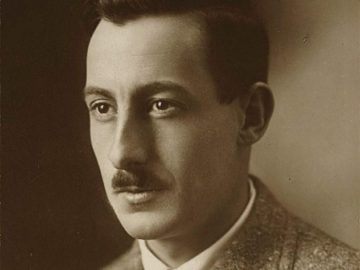Robert Kanigel in Harvard Magazine:
 MILMAN PARRY saw the Homeric epics through new eyes, heard them through new ears. The Iliad and the Odyssey, he said, were the work of generations of illiterate poets who composed orally; their poetry took wing in the moment, were reduced to print only centuries later. The demands of their poetic rhythm, thedum-diddy, dum-diddy of dactylic hexameter, ruled their word choice as much as the gods, heroes, and epic stories they depicted. As a 21-year-old graduate student of Greek at the University of California at Berkeley, Parry, the son of an Oakland pharmacist and the first of his family to attend college, flirted with an early version of this idea in the summer of 1923. It became a succinct master’s thesis that soon was consigned to the library stacks and forgotten. The following year, with his wife, Marian, and their infant daughter, Parry went to Paris, worked on his French, enrolled at the Sorbonne and, under the tutelage of French scholars, refined and expanded his idea into an intricately argued doctoral thesis.
MILMAN PARRY saw the Homeric epics through new eyes, heard them through new ears. The Iliad and the Odyssey, he said, were the work of generations of illiterate poets who composed orally; their poetry took wing in the moment, were reduced to print only centuries later. The demands of their poetic rhythm, thedum-diddy, dum-diddy of dactylic hexameter, ruled their word choice as much as the gods, heroes, and epic stories they depicted. As a 21-year-old graduate student of Greek at the University of California at Berkeley, Parry, the son of an Oakland pharmacist and the first of his family to attend college, flirted with an early version of this idea in the summer of 1923. It became a succinct master’s thesis that soon was consigned to the library stacks and forgotten. The following year, with his wife, Marian, and their infant daughter, Parry went to Paris, worked on his French, enrolled at the Sorbonne and, under the tutelage of French scholars, refined and expanded his idea into an intricately argued doctoral thesis.
In 1928, he returned to the United States and, after a year on the faculty of a small midwestern college, took a position at Harvard, as instructor in Greek and Latin and tutor in the Division of Ancient Languages. He remained at Harvard for the rest of his brief life, which ended in 1935 with the blast of a revolver in a Los Angeles hotel room: At the time it was judged a tragic accident. Later, some would blithely ascribe it to suicide, though the evidence is lacking. Others, within Parry’s family, would see the shooting as his wife’s doing, a moment’s raging vengeance for supposed marital cruelties.
More here.
